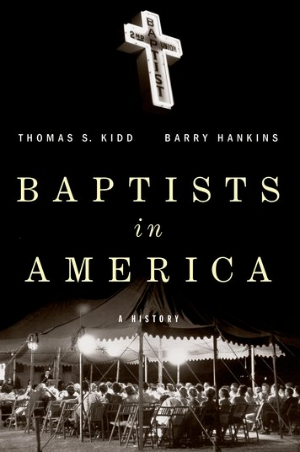Baptists in America: a history
The history of Baptists in America is a complex and important one - and this accessible account has much to inform and encourage
 Baptists in America: a history
Baptists in America: a history
By Thomas S Kidd & Barry Hankins
Oxford University Press
ISBN: 978-0-19-997753-6
Reviewed by Stephen Copson
If you thought the story of Baptists in America was a simple tale of growth and expansion of a biblically evangelical movement, think again. This survey explores through opportunities taken and challenges faced the many strands of Baptist life in America since the arrival of the first Europeans.
At first, they were Christians on the margins doubly marked by their insistence on believer baptism and the separation of church and state. A lasting culture of being outsiders grew up. Political independence offered an opportunity for which entrepreneurial Baptists were well adapted, and they expanded to the south and west. Now Baptists have the second largest religious affiliation in the nation.
“Baptists are notorious for two things – evangelism and schism”. And the authors add even then there was never complete agreement on what was mission and what was a matter for dividing.
They acknowledge the difficulty in pinning down precisely what defines a Baptist – they are not alone - and whilst there are foci around which there is broad agreement (baptism, gathered church and willingness simply to self-identify as Baptist) - for all else there has been a kaleidoscope of views and networks: Calvinist and Arminian, conservative and liberal on theology, pro-fundamentalism and for biblical interpretation, pro-slavery and abolitionist, accepting evolution and firmly creationist. The result has been a potent force of missionary zeal that has helped to shape local, national and international attitudes whilst lacking a core of beliefs to generate common ethical, economic or socio-political frameworks.
The interpretation of the Bible became a major issue with the fundamentalist-social gospel disputes of the 1920s followed in the 1980s by the campaign amongst Southern Baptists for the inerrancy of scripture, with its calculated purge of moderates in conventions, seminaries and mission agencies. These chapters are a salutary read for any who seek to impose uniformity on Baptists whether by doctrinal formulation, confession of faith or appeal to covenant.
The book also contains chapters on the Great Awakening and Revivalism. Another chapter explores the experience of Black Baptists in a culture where the (Southern) whites tended to side with the slave owners, and the emergence of a distinctive Black Baptist identity and style of worship embracing gospel music, which would be the proving ground for later soul and R & B singers and musicians. Slavery and the impact of the Civil War offer further reflections and then the focus moves to the twentieth century exploring theological divisions, civil rights and an approach to political influence.
The authors argue that even when Baptists held influence in the corridors of power nonetheless many found it hard to adjust to being insiders, and often identified threats to underpin that sense of being a vulnerable minority. This is perhaps more pertinent to Southern Baptists than others. Catholics, Communists, liberals have all played the part. Latterly the rallying cry has been to oppose a perceived secular agenda - prayers in school, civil rights, gay and women’s rights and evolution - none of which are uniquely Baptist issues but coalesce in a larger conservative/fundamentalist angst about the way the nation is changing.
The authors are both Baptists and historians who bring clarity and a careful exposition to a complex tale of the varied historical witness of this important evangelical movement in church and society in America. They identify the varying streams of Baptist life and thought beyond the headline-makers and help the reader not to conflate Baptist with Southern Baptist. They are trustworthy guides to the debates, developments and divisions and there is much to inform, encourage and enjoy in this book.
Stephen Copson is a Regional Minister for the Central Baptist Association and Secretary of the Baptist Historical Society
Baptist Times, 26/02/2016